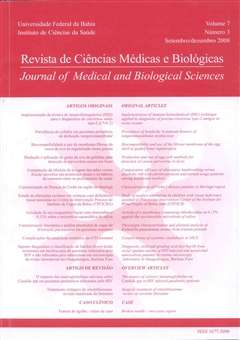The impact of salivary immunoglobulins on Candida spp in HIV infected paediatric patients
DOI:
https://doi.org/10.9771/cmbio.v7i3.4478Keywords:
Children – HIV - Opportunistic Infections - Immunoglobulin A, secretory, Salivary immunoglobulins - Candida spp – Paediatric patients – HIV.Abstract
Immunodeficient paediatric patients, that is, those who lack the ability to respond adequately to an antigenic stimulus, are more liable to develop opportunistic infections, such as the fungal ones. Of these last, one can cite oral candidiasis, caused by Candida spp, and commonly found in HIV infected children. This study has had as its goal to make a revision of the literature about the relationship between salivary immunoglobulins, which constitute the first line of defence for oral mucosa, and Candida spp in HIV infected paediatric patients, emphasising the importance of these antibodies.Downloads
Download data is not yet available.
Downloads
Published
2008-02-02
How to Cite
Pomarico, L., Castro, G. F. B. de A., & Souza, I. P. R. de. (2008). The impact of salivary immunoglobulins on Candida spp in HIV infected paediatric patients. Journal of Medical and Biological Sciences, 7(3), 294–300. https://doi.org/10.9771/cmbio.v7i3.4478
Issue
Section
Review Articles
License
The Journal of Medical and Biological Sciences reserves all copyrights of published works, including translations, allowing, however, their subsequent reproduction as transcription, with proper citation of source, through the Creative Commons license. The periodical has free and free access.


